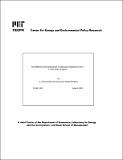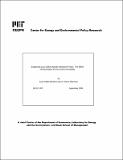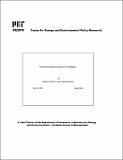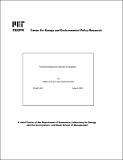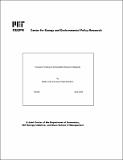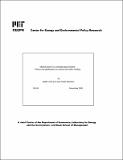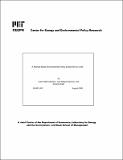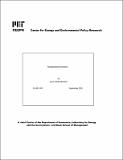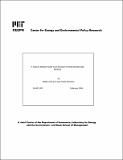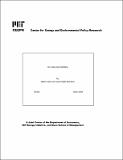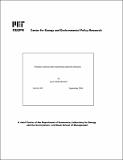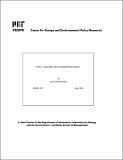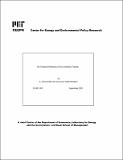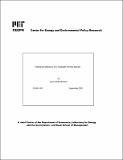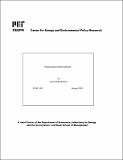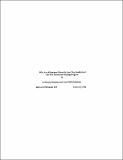Browsing Working Papers by Author "Montero, Juan-Pablo"
Now showing items 1-19 of 19
-
The efficiency and robustness of allowance banking in the U.S. Acid Rain Program
Ellerman, A. Denny; Montero, Juan-Pablo (MIT Center for Energy and Environmental Policy Research, 2005)This paper provides an empirical evaluation of the efficiency of allowance banking (i.e., abating more in early periods in order to abate less in later periods) in the nationwide market for sulfur dioxide (SO2) emission ... -
Electricity sector restructuring and competition : lessons learned
Montero, Juan-Pablo (MIT Center for Energy and Environmental Policy Research, 2004)I explore the advantages of tradable emission permits over uniform emission standards when the regulator has incomplete information on firms₂ emissions and costs of production and abatement (e.g., air pollution in large ... -
Explaining low sulfur dioxide allowance prices : the effect of expectation errors and irreversibility
Montero, Juan-Pablo; Ellerman, A. Denny (MIT Center for Energy and Environmental Policy Research, 1998)The low price of allowances has been a frequently noted featured of the implementation of the sulfur dioxide emissions market of the U.S. Acid Rain Program. This paper presents theoretical and numerical analyses that explain ... -
Forward trading and collusion in oligopoly
Liski, Matti; Montero, Juan-Pablo (MIT Center for Energy and Environmental Policy Research, 2004)We consider an infinitely-repeated oligopoly in which at each period firms not only serve the spot market by either competing in prices or quantities but also have the opportunity to trade forward contracts. Contrary to ... -
Forward trading and collusion in oligopoly
Liski, Matti; Montero, Juan-Pablo (MIT Center for Energy and Environmental Policy Research, 2005)We consider an infinitely-repeated oligopoly in which at each period firms not only serve the spot market by either competing in prices or quantities but also have the opportunity to trade forward contracts. Contrary to ... -
Forward trading in exhaustible-resource oligopoly
Liski, Matti; Montero, Juan-Pablo (MIT Center for Energy and Environmental Policy Research, 2008)We analyze oligopolistic exhaustible-resource depletion when firms can trade forward contracts on deliveries, a market structure prevalent in many resource commodity markets. We find that this organization of trade has ... -
Market power in a storable-good market : theory and applications to carbon and sulfur trading
Liski, Matti; Montero, Juan-Pablo (MIT Center for Energy and Environmental Policy Research, 2005)We consider a market for storable pollution permits in which a large agent and a fringe of small agents gradually consume a stock of permits until they reach a long-run emissions limit. The subgame-perfect equilibrium ... -
A market-based environmental policy experiment in Chile
Montero, Juan-Pablo; Katz, Ricardo Santiago; Sánchez, José Miguel (MIT Center for Energy and Environmental Policy Research, 2000)Despite growing interest in the use of emissions trading for pollution control, empirical evidence for this regulatory instrument has been confined to a few experiences in the United States. This paper broadens the empirical ... -
Multipollutant markets
Montero, Juan-Pablo (MIT Center for Energy and Environmental Policy Research, 2001)I study the optimal design of marketable permit systems to regulate various pollutants (e.g. air pollution in urban areas) when the regulator lives in a real world of imperfect information and incomplete enforcement. I ... -
A note on market power in an emission permits market with banking
Liski, Matti; Montero, Juan-Pablo (MIT Center for Energy and Environmental Policy Research, 2004)In this paper, we investigate the effect of market power on the equilibrium path of an emission permits market in which firms can bank current permits for use in later periods. In particular, we study the market equilibrium ... -
On Coase and Hotelling
Montero, Juan-Pablo; Liski, Matti (2009)It has been long recognized that an exhaustible-resource monopsonist faces a commitment problem similar to that of a durable-good monopolist. Indeed, Hörner and Kamien (2004) demonstrate that the two problems are formally ... -
Pollution markets with imperfectly observed emissions
Montero, Juan-Pablo (MIT Center for Energy and Environmental Policy Research, 2004)I study the advantages of pollution permit markets over traditional standard regulations when the regulator has incomplete information on firms₂ emissions and costs of production and abatement (e.g., air pollution in large ... -
Prices vs. quantities with incomplete enforcement
Montero, Juan-Pablo (MIT Center for Energy and Environmental Policy Research, 1999)This paper extends Weitzman's (1974) "Prices vs. Quantities" to allow for incomplete enforcement. Whether the regulator uses prices (e.g., taxes) or quantities (e.g., tradeable quotas), a first-best design is always ... -
A simple auction mechanism for the optimal allocation of the commons
Montero, Juan-Pablo (MIT Center for Energy and Environmental Policy Research, 2006)Efficient regulation of the commons requires information about the regulated firms that is rarely available to regulators (e.g., cost of pollution abatement). Different mechanisms have been proposed for inducing firms to ... -
The temporal efficiency of SO₂ emissions trading
Ellerman, A. Denny; Montero, Juan-Pablo (MIT Center for Energy and Environmental Policy Research, 2002)This paper provides an empirical evaluation of the temporal efficiency of the U.S. Acid Rain Program, which implemented a nationwide market for trading and banking sulfur dioxide (SO2) emission allowances. We first develop ... -
Testing the efficiency of a tradeable permits market
Montero, Juan-Pablo (MIT Center for Energy and Environmental Policy Research, 2002)A tradeable permits market is said to be efficient when all affected firms trade permits until their marginal costs equal the market price. Detailed firm-level data are generally required to perform such an efficiency test, ... -
Trading quasi-emission permits
Montero, Juan-Pablo (MIT Center for Energy and Environmental Policy Research, 2002)I study the design of environmental policies for a regulator that has incomplete information on firms' emissions and costs of production and abatement (e.g., air pollution in cities with numerous small polluting sources). ... -
Welfare-enhancing collusion in the presence of a competitive fringe
Montero, Juan-Pablo; Guzmán, Juan Ignacio (MIT Center for Energy and Environmental Policy Research, 2005)Following the structure of many commodity markets, we consider a reduced number of large firms and a competitive fringe of many small suppliers choosing quantities in an infinitehorizon setting subject to demand shocks. ... -
Why are allowance prices so low? : an analysis of the SO2 emissions trading program
Ellerman, A. Denny; Montero, Juan-Pablo (MIT Center for Energy and Environmental Policy Research, 1996)This paper presents an analysis of the reduction in SO2 emissions by electric utilities between 1985 and 1993. We find that emissions have been reduced for reasons largely unrelated to the emission reduction mandate ...
